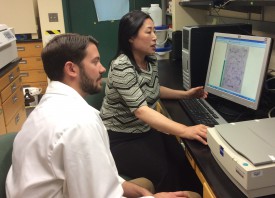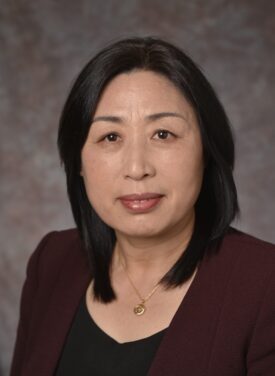Bingru Huang, Distinguished Professor in the Department of Plant Biology, is principal investigator of the project, “Mobile Remote Sensing and Artificial Intelligence-Guided Precision Management Program for Turfgrass Water Conservation.” Funded by the U.S. Department of Agriculture-National Institute of Food and Agriculture in the amount of $3,999,741, the project involves a collaborative team from three academic institutions—Rutgers University, University of Georgia, and University of California, Riverside, and a private industry—Siemens Corporate Technology.
The project focuses on turfgrass stakeholder needs for efficient and water-saving irrigation practices and drought-tolerant turfgrasses. The goal is to develop site-specific precision irrigation management (PIM) programs targeting water conservation applicable for cool and warm season turfgrasses in a wide range of landscapes (lawns, golf courses and sod farms).
The long-term goal is to improve profitability and reduce water consumption for a sustainable turfgrass industry. The project involves a transdisciplinary team, including turfgrass scientists and breeders, mechanical/automation/artificial intelligence engineers, economists and extension specialists.
Irrigation is an essential practice in turfgrass production and maintenance, and it is also the costliest turfgrass management regime. Water availability for turfgrass irrigation is becoming increasingly limited and costly due to shortages of fresh water supplies and declining precipitation. Water use restriction is among the top three problems facing the New Jersey golf course industry, according to The New Jersey Turfgrass Industry: 2019 Economic Impact, Structure, and Characteristics Report. Inadequate water levels cause loss of turf ground cover, resulting in negative impacts on the aesthetics and functionality of turfgrass.
Developing water conservation programs for efficient use that reduce unnecessary water usage has become extremely important to maintain a sustainable turfgrass industry. Water conservation can be achieved through an integrated approach that implements site-specific precision irrigation management for the application of water in the correct amounts, in the proper places, and at the right times and uses water-saving and drought-resistant turfgrass species and cultivars to reduce irrigation requirements and improve water use efficiency.
For Huang, the project collaboration holds a special connection with the University of Georgia (UGA) team, as one of the researchers on the project is David Jespersen, assistant professor in crop and soil sciences at UGA, and her former doctoral student at Rutgers (GSNB ’16). Huang and Jespersen also serve together on the editorial board of the journal Grass Research, with Huang as editor-in-chief, and Jespersen an associate editor.

David Jespersen and Bingru Huang during his doctoral studies at Rutgers, reviewing images of roots to explore how changes in CO2 concentration affects below-ground growth. Photo: Paula Walcott-Quintin
“Turfgrass irrigation management is challenging due to the complexity of management and culture systems, which consist of multiple grass species used for different purposes across a range of climatic conditions that require distinct management practices and resource inputs,” said Huang.
“In addition, there are large spatial and temporal variability in soil and microclimatic conditions in a given turfgrass system. Site-specific PIM is an effective approach to reducing water use by improving irrigation efficiency. Developing site-specific PIM programs for turfgrasses that optimize water use is critically important for an economical, environmentally sustainable and socially beneficial turfgrass industry,” she said.
For Jespersen, precision technologies allow growers to use irrigation more efficiently and accurately, with economic and environmental benefits.
“Water is a major issue with turfgrass, as there is a lot of competition for freshwater resources. That is where precision irrigation management comes in — it allows you to only apply the water where it is needed,” he said.
Research on the project for the five-year grant got underway in Fall 2021.


